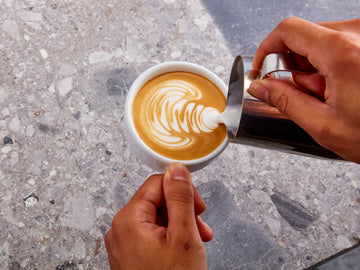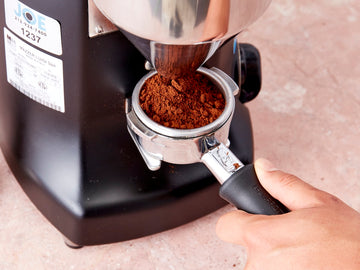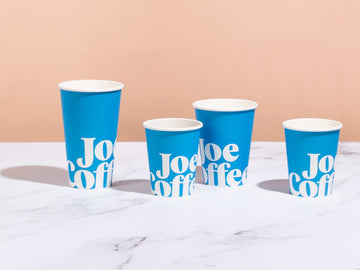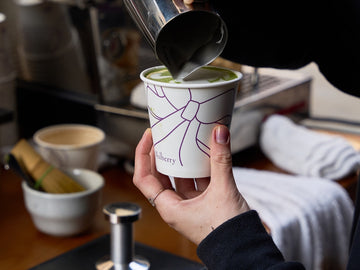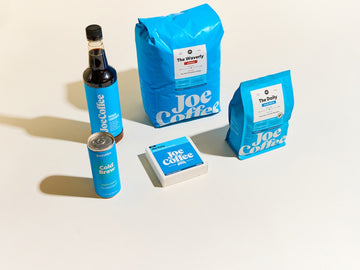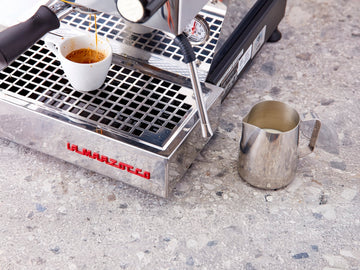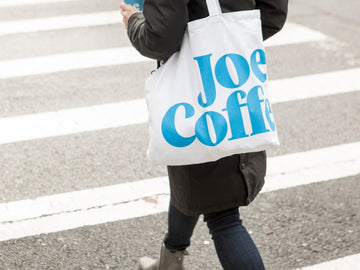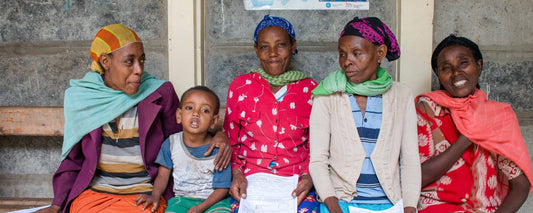interview
Categories
All articles
Celebrating 1 Year of the Women in Coffee Project
Joe Coffee's Director of Roasting, Amaris Gutierrez-Ray, is the founder of the Women in Coffee Project (WICP). Amaris has worked in coffee for more than a decade—from barista to retail manager to production to her job today at Joe, managing the roasting department as well as sourcing green coffee. Along the way, she found herself asking questions. Questions like: why do women do so much behind the scenes in coffee, particularly at origin, but their voices aren't heard? In what ways can we share their truth with others throughout the community? How can we celebrate them and elevate their experience? We spoke with Amaris at Year One of the WICP to discuss the path this journey has taken so far.Congratulations on 1 year of the Women in Coffee Project! For those who aren't already familiar, can you tell us what the Women in Coffee Project is, and describe your mission?
Thank you! I have been thinking we need to have a birthday party or something to celebrate. We started in October of 2018, so we are a little overdue!
The Women in Coffee Project is a platform for women in different roles in coffee-producing countries to share their stories and their perspectives. The world of coffee is as complex as it is diverse, and without context, it’s difficult to learn about, or even measure, gender equity from country to country. [caption id="attachment_30311" align="alignnone" width="2560"] Gender in Coffee Documentary Screening in Baltimore[/caption]What inspired you to start the Women in Coffee Project?
When I started the WICP, I was impressed by the fact that women make up about 75% of the workforce in coffee, and are often in roles that directly relate to quality in the early stages of a coffee supply stream (hand-harvesting, processing, fermentation). The specialty coffee industry is really concerned with quality and consistency, and yet I was surprised to learn the voices of women are not the majority heard.
I started searching the internet for more information about gender equity, and also quickly realized that research and measurements differ depending on who is reporting the data. And, on top of that, there’s a lot that is difficult to measure in the first place. For example, a common obstacle for female producers to access training or workshops in their regions is a lack of transportation and/or childcare. In order to accurately report whether a training session has been successful in reaching women in that community, one also needs to measure if they are providing those things so that women can actually attend. The context there is key. That’s the difference between equity and equality: moving toward a more equitable future means we are observing the differences between us and accounting for them.
Our mission is to do just that. We also hope for information to go back and forth between consuming and producing countries. We have great technology on our side! We primarily use Instagram as a means to communicate and take a peek into each other’s lives. We do full-length interviews with women in different roles, and then publish them online and give them the space to do an Instagram Takeover and share what a day or a week in their life looks like.
In what ways do you work to facilitate dialogue and provide an empowering platform for women in the coffee industry?
There is a lot of demand right now for transparency in coffee from the consuming side, which is a truly wonderful thing, but I think consuming countries also need to be open to questions asked of us. We see a need for a space to engage outside of preexisting business relationships. We advocate for awareness, and that means encouraging each other to be aware of any subconscious power dynamics inherent to roles between first- and third-world countries. Simply being aware is often the key to learning how to act with sincere professional respect.
That’s why the other key component of our vision is to invite four or five women (in groups of 2, for community and support) each year here to NYC for a panel event and visit. Their stay gives us more time to listen to each other, ask questions, taste coffee together, and learn from each other. Throughout the year we fund raise to be able to cover all transportation and lodging costs for our invited guests. We also host events to support organizations that are engaged with supporting women in coffee-growing regions (in the past we have hosted fundraisers for Grounds for Health, the Partnership for Gender Equity, and the International Women’s Coffee Alliance). [caption id="attachment_30308" align="alignnone" width="1024"] First Annual Women in Coffee Panel Event, April 2019[/caption]
Has the WICP and its goals evolved at all since its inception? If so, how?
We have definitely evolved. I think when we started I envisioned us hosting panel events every quarter, but I was quickly humbled to learn we need to work around a producing woman’s schedule, and not my own! Every country has its own harvest schedule, so I had to be open to the dates that worked for the women I was inviting. In the same way, truly listening (as an active verb) takes time! Interviews take time, especially when we are primarily connecting over the internet and speaking during a harvest season. It’s humbling when someone makes time to answer questions for an interview for this project, so I try to honor that time by being as intentional as possible.
We also have become more of a resource. Different companies have asked how they can get more involved in gender equity, and support women in coffee. Since we don’t provide market access to female producers ourselves, we share lists of coffees from different IWCA chapters or encourage roasters to consider donating portions of retail sales to organizations supporting women in coffee. [caption id="attachment_30339" align="alignnone" width="750"] 2019 Women's History Month Cupping series[/caption]What kinds of projects or programming did you take on last year?
Last year we hosted a month-long cupping series for Women’s History Month. We invited different roasting and importing companies to highlight the female producers in their supply streams, and opened the tastings to the public. It was so great to see the energy and enthusiasm that other companies have for supporting gender equity and celebrating coffees produced by women. It brought different communities here in NYC together and was a great way to learn more about how gender equity is expressed differently. Having access to someone from an importing company for an evening to ask questions was radical, and I noticed it sparked a lot of enthusiasm for folks from roles in retail spaces, who don’t often have the opportunity to engage with this side of coffee.
We also collaborated with Fincas Mierisch in Nicaragua to make WICP tote bags! It came out of a conversation with the panelists from Nicaragua last year, about how off-season work is hard to find. A project like this allowed us to pay a fair wage for the materials and labor to make the tote bags, allow for a little more job stability for a group of women outside of harvest time, and incorporate local jute and the screen printing press they use to print coffee sacks. The women collaborated with a local dressmaker to put them all together and add in colorful straps. Each tote can hold up to 12 pounds of green coffee ;) And it gave us a product we could use for our own fundraising efforts. We’re definitely going to try to do this again in 2020! [caption id="attachment_30309" align="alignnone" width="1280"] Screen printing Women in Coffee tote bags[/caption]Q: Starting the WICP was an ambitious undertaking with your workload as our Director of Roasting. What were some of the biggest things you learned in the process?
Wow, so much! (I’d be lying if I said I had time management figured out. It’s a process!) My day job overlaps with some of my goals for the WICP. Learning how to listen, how honesty and compassion are two sides of a coin and both should be inextricable from respect, the vulnerability of being grateful and sincerely generous -- these will always require practice. The WICP has given me a lot of practice, and it’s benefitted my Joe role in ways even I probably can’t imagine.
To be candid for a second, it’s not part of my personality to be overly emotional or even understand emotions very well, but through this project, I’ve been exposed to many different, passionate women all over the world. Speaking with them has fired me up, given me access to myself in some ways, and has also incubated a deep appreciation for the emotions we all share. It’s a great human gift and offers us common ground. [caption id="attachment_30340" align="alignnone" width="2560"] Amaris leading a WICP Talk at the NY Coffee Festival, Oct 2019[/caption]Q: You've had the unique opportunity to have conversations with many women. Can you share one of the most interesting conversations you've had?
For last year’s panel event, my Nicaraguan mom surprised me by showing up for it. She came the day before the event, and I had planned to have dinner that night with coworker Kendra Sledzinksi and our invited panelists (Eleane Mierisch, Haisell Beteta, Dulce Barrera, and Melanie Herrera). The women we invited for that panel, our first event, were all native Spanish-speakers, like my mom, and from Nicaragua and Guatemala. So my mom came with me to dinner, and while we were heading over there, I remembered in each of the interviews with the panelists beforehand, they had responded “my mom” to the question “Who inspires you the most?”
Being able to introduce my mom, one of the original strong women in my own personal experience, to these women I had learned so much from was really moving. We had an amazing conversation that night, about Nicaragua past and present, and so many other things. Kendra made an effort to speak in Spanish, the panelists made an effort to speak in English to share the burden, and my mom was so happy. It made me grateful for my own history and all of the moments that connected us in that group. The strength of women everywhere is a truly powerful thing. [caption id="attachment_30357" align="alignnone" width="1280"] Dinner with the 2019 WICP panelists[/caption]Your Instagram bio says, "One story isn't enough to understand a person or place." Through the dialogue the WICP has opened up, what would you say are the most common themes and challenges facing women in the industry?
Like in the rest of the sector, the challenges women face are related to economic disparity, adapting agricultural practices quickly to account for climate changes, access to healthcare. I’ve also heard a lot of practical optimism. The temporal nature of coffee as an agricultural product and the unity of communities working together seems to lend itself well to looking ahead to what can be improved in the coming years.
What's on the horizon for the WICP this year?
This year we’re going to step up our communication game. I’m building a newsletter and learning how to improve our Instagram and marketing plans. We’re going to lean into our reputation for being a resource and create some documents that can be widely shared about how to get involved in the movement for gender equity. We’ll host our second annual panel event in October (panelists and date still TBD). We’ll publish even more interviews and Instagram Takeovers. We’ll take a few more steps toward our 3-year plan of attaining 501c3 non-profit status. We’ll collaborate on making some more tote bags with the community of women working for Fincas Mierisch in Nicaragua. I sense we are just hitting our stride after a period of a learning curve, and I can’t wait to see where this year takes us.
View this post on Instagram
Photo: Marianela visiting don Adrian Hernandez farm in Heredia in the Central Valley region. ?Hello again from Marianela Montero, this week’s Instagram Takeover! ?I really enjoyed tasting different coffees and learning what details are behind every cup of coffee. The relationships we build throughout the years are something I really value about coffee and my job. Coffee in general teaches you to be patient, for example think how long does it take a coffee plant to produce coffee, it can take 4 years and even more from the moment we grow it until we harvest the first cherries. I very much appreciate that Costa Rica is a very peaceful country and easy to travel and meet people compared to other origins. ?In 2018 I started together with my husband - Selva Coffee. Right now it’s just the two of us and during the harvest we get help, usually, an intern helps us, currently, this intern is a woman, her name is Maria Paula, she is the daughter of a farmer we work with, she is very passionate and loves coffee. I feel very lucky and proud to teach her the knowledge I’ve acquired during these years. I also work closely with a logistics company, they are of great support. In my country most of the people are men, but I always feel respected and appreciated by them. I’ve been working with them for four years and I cannot complain. We also work constantly with farmers, roasters, and importers; a few of them are women but mostly men. ?It is interesting to work with different cultures that have a reputation for having unequal status between women and men because in my case I feel even with these cultures having this reputation and I’m empowered and respected by them. I have to say I feel very supported and respected in general by both men and women, but there is something that makes me very excited and happy about working with women in coffee and seeing the strength we share and all the things we have accomplished in this industry. I’m the woman leader in my company :) #costarica #selvacoffee #mujereslideres #strongwomenofcoffee #womenincoffeeproject #bilingual #mujeresencafe #instagramtakeover #cafedecostarica
A post shared by Women in Coffee Project (@womenincoffeeproject) on Jan 22, 2020 at 4:27am PST
How Grounds for Health Is Working to Prevent Cervical Cancer in the Coffeelands
We're great admirers of Grounds for Health, whose mission to provide cervical cancer screening in developing countries—specifically in remote coffee-growing regions—has made a dramatic impact on women's lives. In honor of Cervical Cancer Awareness Month, we are excited to introduce you to the great work they are doing for women's reproductive health in the coffeelands.Our Director of Roasting and founder of the Women in Coffee Project, Amaris Gutierrez-Ray, had the opportunity to interview Ellen Starr MSN, WHNP, Grounds for Health's Executive Director. A Nurse Practitioner, Ellen started at the nonprofit as a clinical volunteer, while she practiced at Planned Parenthood of Northern New England. In 2018, she became Grounds for Health's Executive Director.A special thank you to Amaris and the Women in Coffee Project for allowing us to re-post this interview!But first, a short historyIn 1996, coffee executive Dan Cox and his friend the late Dr. Francis Fote were visiting coffee cooperatives in Mexico. They learned that cervical cancer rates there were some of the highest in the world. Dr. Fote, an OB/Gyn, knew quite well that cervical cancer is preventable and—when caught early—one of the most treatable forms of cancer. They took action, and Grounds for Health was born.These days, Grounds for Health focuses their work in Ethiopia and Kenya, where they reach women who live and farm in some of the world's finest, and most under-served, coffee growing regions. To date Grounds for Health programs have resulted in 114,833 women screened, 9,355 women treated, as well as providing clinical training for more than 400 healthcare providers.We are incredibly proud to support the work of Grounds for Health through our supply chain partner, Caravela Coffee. Through our purchasing, we have contributed funds which have helped train health workers and provide screenings to over 375 women in the Sidama zone of Ethiopia in the past two years (saving approximately 40 lives through early detection) and we look forward to growing this support more and more in the future.[caption id="attachment_29715" align="alignnone" width="640"] Ellen Starr (left) greeting Grounds for Health Clinical Specialist Aster Tilahun.[/caption]A: Let’s jump right in! Grounds for Health is currently operating in Ethiopia and Kenya, though in the past you all have worked in Mexico, Nicaragua, Peru, and Tanzania. What have you had to adapt to or change as you have grown? How do you manage that?
E: Grounds for Health (GfH) has been around since 1996, and over these years our approach to how we do things has evolved, in step with changes in cervical cancer prevention and the areas we serve. But our focus has always been on reaching women in very remote, coffee growing regions. There is a real commonality no matter what country we are in, to meeting the needs of women and their communities. From an equity perspective—as we all know—even in our country, women don’t all have equal access to quality health care.
Women are such key players in their families, communities, churches, and make up a large percentage of the workforce at the beginning of the coffee supply stream. They have long days! When women get sick or die, it has an outsized impact, and this is consistent everywhere. What we have found to be different, as we work in different places, is language, culture, and the support from Ministries of Health. But always the fundamental goal in any country is to reach the women at the end of the road.
A: It is hard to be a nonprofit, as the organization needs so much structural support, not just financial? I’m interested in how that changes. How big of a difference do you see in how medical communities receive and support you in different countries?
E: Very different! Our approach is to screen-and-treat for cervical pre-cancer in one visit, and we know that this works in low resourced areas. We have good relationships with Ministries of Health. A lot is culturally based and financial-based. The Ministries of Health play different roles in decision making about when and how cervical prevention training happens.
If a country is interested in what we offer, and also really wants autonomy with medical protocols, we have said absolutely yes...and then make sure the partnerships are really strong. Over the years, we have received a high level of respect for our work, and out of this respectful relationship, we have been ultimately successful introducing new technologies and approaches to women’s care.
But if they are stuck on one way of doing things—that we know will not result in an adequate number of women receiving treatment when needed—we can’t really go forward. For instance, a country might be really interested in a PAP based “western” system (that actually isn’t perfect even in a high income country). The country might be unwilling to acknowledge that Pap is not feasible without well-trained pathologists in significant numbers, and strong transportation and communication channels so women can get results and return for treatment. Without all of these elements in place the whole thing would fall apart. So this would actually require a great deal of additional investment, which they can’t do.
We are very tuned into these nuances of community readiness, and our first step is always to form strong partnerships. This is another way GfH is unique; we work within the public health system. We develop programs that can be implemented in existing models. This means we can help women out in the middle of nowhere because there is almost always some dispensary or health center out there that we can reach. And the medical teams our staff train and support are salaried by their government, so there is a stable foundation for impact.[caption id="attachment_29710" align="alignnone" width="1280"] This is a typical scene at a clinic where women are registered and waiting for their screening.[/caption]A: Was it difficult to put together the single visit approach? Was it new?
E: I’m not sure of the exact moment when the single visit approach came about, but it was a critical component of our work from the beginning. It did take some time for other health organizations to get on board. Some people were more interested in introducing new technologies; but if you don’t treat on the same day, why bother? Again, it’s often difficult for a woman to come back to receive her needed treatment, in these remote communities. It’s almost unethical to tell her she has a positive result then not be able to ensure treatment. Same-day screening and treatment are not always easy, but as long as we keep it as the highest priority when we implement programs, we can always make it happen.
The method we focus on and stand by, are our “campaign” models. Our staff set up 2-3 day campaigns, and begin by connecting with Community Health Promoters we have already trained. These dedicated people engage in community sensitization and education as well as the recruitment of women for the campaigns. Then we bring in all our equipment, set up a space with privacy walls (sometimes hung curtains) and women come in. Sometimes the coffee coops will help with outreach and transportation. We have found that women love to get away from their world for the day. Seeing images of women hanging out on the lawn with their babies while waiting for their turn is kind of wonderful. While we focus on how many women we can see (before dark) we ensure that they are getting the best female-focused care. We prioritize privacy, informed consent, and respectful care. On our best day we can see 120 women! Over three days you are seeing a lot of women in a short time.
Our women-centered models are incredibly important to our success, as long as the underpinning values are held high. But we are nimble so we can change up the model if/as needed.[caption id="attachment_29711" align="alignnone" width="1280"] An Ethiopian health center employee is explaining the screening and treating procedure. Multi-day "campaigns" are a way of reaching lots of women, and offer an immersion experience for clinicians Grounds for Health trains.[/caption]A: I’ve heard from others that a lack of child care can prohibit access to healthcare, training, etc. Do you find it is common for coops to give support for transportation? Is it part of your intentionality to bring children?
E: Training clinicians and health workers through campaigns (and ongoing clinical support) is what we do. Barriers for women to access these campaigns are many: time (away from work); childcare; family expectations; permission from their husbands (which is probably one of the hardest things for us in the US to fathom); transportation. The coop can really help with all of these. The coop can support, for instance, informational meetings with the men. Some coops only have the resources to talk us up. So, it varies. The women’s responsibilities in their communities are vast. Taking time for their own care is difficult.[caption id="attachment_29714" align="alignnone" width="1280"] Grounds for Health often sees women from multi generations, and children are welcome. GfH staff will watch young children while their mothers are being seen so women feel safe and comfortable.[/caption]A: Do you notice any psychological shifts? Sometimes women feel like they can’t take care of themselves. Health care feels like it is luxury rather than a need.
E: Women, when they come in for health care, experience a person focusing on them and their health. They learn that they are worth the effort to ensure that they don’t die from something they may have seen female relatives die from. They come in fearful. Then they walk away from their screen-and-treat feeling empowered by the opportunity to take care of themselves and being supported by their communities to do that.
A: It is harder to make those impacts visible…
E: Yes, a lot of nonprofits are interested in gender equity and empowerment, but how do you actually talk about those impacts of empowerment? It can seem “soft” and it is not especially measurable…and people like measurables, like how many women we are able to treat in a day.
A: There can be misunderstandings, even between spouses. That empowering experience can really impact misinformation.
E: We have seen some horrible things because of miscommunication or rumors. That is why we need this strong Community Health Promoters. Depending on the community, if you start with the village elders, shamans, the priest, then everyone starts to think that keeping women healthy matters. But there still will be rumors. HPV (the virus that causes cervical cancer) sounds like HIV. Our Community Health Promoters can correct misinformation in their own communities.
For instance, since I am a clinician I periodically travel from Vermont and go to the field to do some assessment, evaluation, and refresher training. Several years ago we had started a program in the foothills of a country in East Africa. The coop had identified their most respected members and we trained them specifically as CHPs. It took many hours of slow driving on poor roads to get to this really remote region. And then when I finally arrived, there were no women to be seen! The Community Health Promoter who had been assigned to help with the campaign went out to ask around. And she found out that the women thought the health provider was going to reach in, pull out the uterus, cut it out, and then push it back in. Horrifying! But you can understand where this misinformation came from. These women have never had a speculum exam, and there is something going “in and out”...but it is a probe. We tell them we have “removed” the bad cells…so the language is there, but the story being told was totally skewed. What happened next is so indicative about how we work in partnership with the community. The village priest heard about this rumor and got right on it; he spent his next sermons talking about cervical cancer. And then the women came. It was a powerful man talking positively about cervical cancer care and women’s health. We all worked together.[caption id="attachment_29717" align="alignnone" width="1280"] Coffee co-ops partner with Grounds for Health to contribute to the wellbeing of women who work in their industry. Here, they are helping to transport women to a screening. The Ethiopian women are singing as they arrive at a clinic.[/caption]A: Are you noticing other kinds of disparity when it comes to health care? What else is lacking?
E: There is a lot. We work with a specific focus, because cervical cancer is a preventable disease and also a horrible disease to die from. We aren’t distracted. What hasn’t happened, and it will take a considerable amount of time to solve for, is to reduce transportation barriers. This is connected to economic disparity and limited access to resources. In remote areas, one often needs to travel far to access treatment for cancer, and who has the money to take an airplane to get treatment? Our staff sends me images of cervixes for review, which is part of our supervision and support practices. Last week I looked at 50 images and three were frank cervical cancer, which made me want to cry. So that is why prevention, and catching this before it becomes cancer is so important! Prevention treatment can happen on site; cancer treatment is mostly unattainable for the women we see.
A: Do you have educational materials? Is there anything you can offer a woman with cancer?
E: When we work in remote communities we are sometimes talking with women who might not be literate. A big issue could be a tribal language. Sometimes our staff doesn’t know how to speak the local language. So when our staff in Ethiopia go out to talk to women, they will be challenged to get the information translated correctly; but they will! Even without language, though, we can express and communicate respect. It’s a high-stake medical situation, so we need to bring in the important element of humanism and go into a community with that fundamental attitude.
We are so respectful of women we see. When it comes to training staff, people think we are training them about how to identify cervical pre-cancer. And our response is to say we are teaching you that ... but we are also showing you how to “treat” women, how to insert a speculum so she doesn’t experience pain, and how to be respectful of her dignity and privacy. These qualities matter!
A: Without that there will never be equity. Something I have learned in gender equity—that value set has to be part of the vision, how you communicate and establish yourself. You are integrating with different types of people, and you can’t make that go away. But that respect connects it all together.
E: It has been a challenge to find women to be on our in-country staff, because women generally don’t have the same education opportunities. The young male clinicians we train might have an attitude that they are more important than the women they see. And we help change that attitude. Watching how they change and adjust is promising.
We also look at eliminating the idea that we are the “white savior from the West.” We work to show we are partners. For instance, it was really powerful when, as a white woman from the west, I stood up in a village meeting and said I have had HPV. It was so powerful for them to see and hear that; we have commonality and all are susceptible.
***Through your purchases at Joe Coffee, you help us support the good work Grounds for Health is doing for women in coffee. To donate directly, please visit the Grounds for Health donation page.

